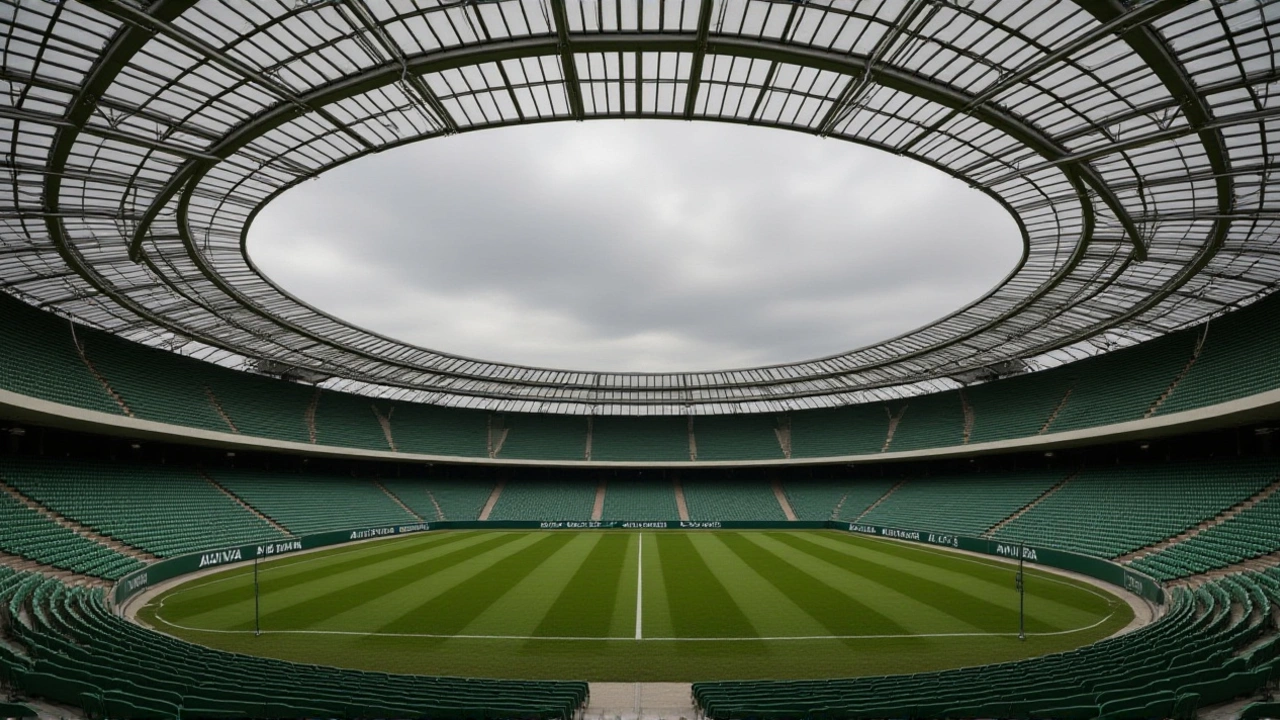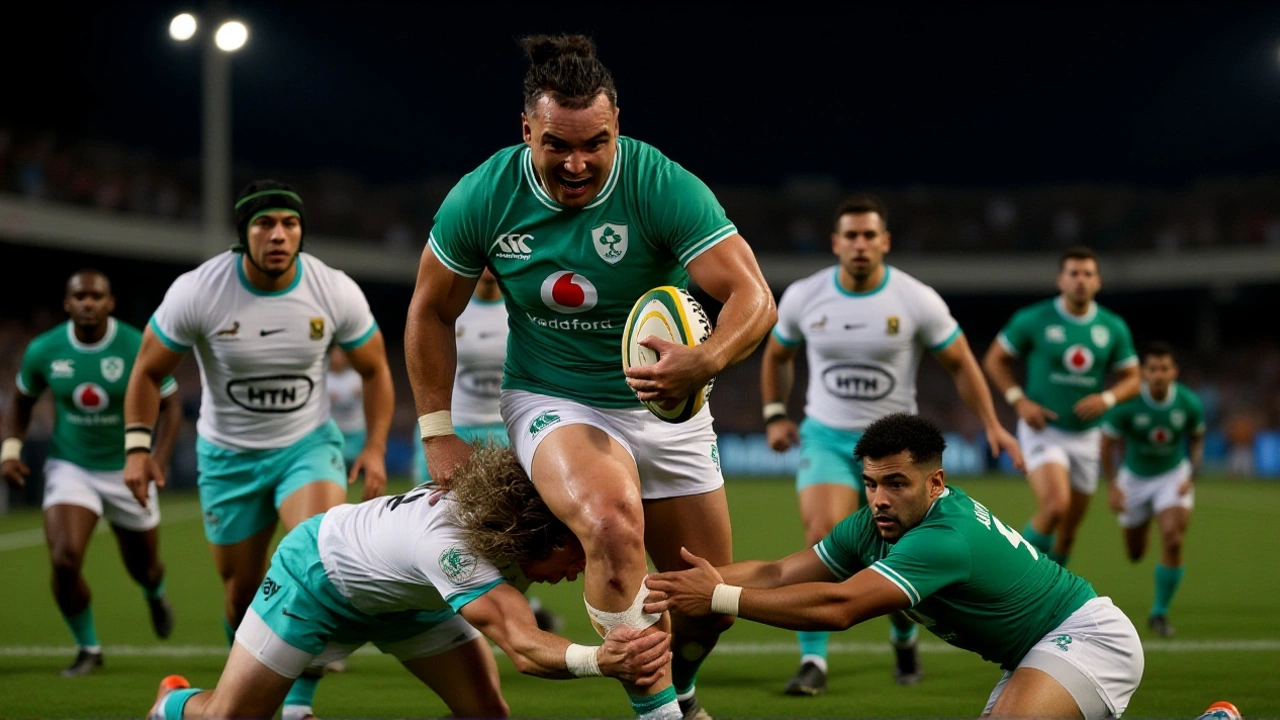
When the final whistle blew at Aviva Stadium on Saturday, November 22, 2025, the South Africa national rugby union team — the reigning Springboks — had done the unthinkable: they outlasted, outmaneuvered, and out-disciplined a determined Ireland side in a bruising 24-13 victory. It wasn’t just a win. It was a statement. And for Irish fans, it was a gut-punch ending to their Autumn Nations Series 2025 campaign.
Disaster in the Red Zone
The match, officiated by referee Matthew Carley with assistants Karl Dickson and Christophe Ridley, started as a tactical chess match. But within 30 minutes, it turned into a disciplinary freefall for Ireland. Irish Rugby Football Union’s team, fresh off a gritty Six Nations campaign, was already under pressure from South Africa’s relentless scrum dominance. Then came the cards. First, Prendergast saw yellow for repeated infringements. Then, substitute Jack Crowley — brought on after an HIA for O’Brien — was penalized for cynical ruck play. Ireland was down to 12 men. And just as they clawed back to 13, Andrew Porter was sin-binned for a scrum offense. Three yellow cards. Three separate moments when Ireland’s structure cracked. At one point, they were down to 12 for over eight minutes.Springboks Capitalize on Chaos
The South Africa national rugby union team didn’t need much. They didn’t need flair. They needed space. And Ireland, stripped of numbers, gave it to them. Cobus Reinach scored in the 34th minute after South Africa turned penalty after penalty into territory. Ireland’s defense held firm — until the scrum. On the five-meter line, with Ireland down to 12, the referee awarded a penalty try. 19-7. Halftime. No comeback narrative could mask the reality: Ireland’s discipline had collapsed under the weight of pressure. Even when Josh van der Flier broke free from a lineout to set up Dan Sheehan for a try just before the break, it felt like a consolation. South Africa’s defense, anchored by veteran Boan Venter (whose try was disallowed for a forward pass), was impenetrable. Two last-ditch tackles from Crowley in the second half kept Ireland alive, but the damage was done. Final score: 24-13.The Cashless Stadium, The Silent Crowd
The Aviva Stadium in Dublin 4, with its 51,700-seat capacity, was packed. But the atmosphere was muted. Not because of the weather — it was a crisp November night — but because of the rules. No bags. Not even a small backpack. Only handbags, subject to search. And no cash. Ever. The stadium’s cashless policy, now standard for all matches, meant fans could only pay with cards or digital wallets. Lines moved faster, sure. But something was lost. The buzz of handing over a €20 note for a pint, the clink of coins, the shared joke with the vendor — gone. In its place: the beep of a card reader and the quiet efficiency of a system designed for speed, not soul.
What This Means for Ireland
This wasn’t just a loss. It was a warning. Ireland’s forward pack, usually their greatest strength, was outmuscled. Their lineout, usually reliable, struggled under pressure. And their discipline — the hallmark of Joe Schmidt’s legacy — was in tatters. Matthew Carley didn’t favor South Africa. He simply enforced the rules. And Ireland couldn’t keep up. The Springboks, world champions for a reason, know how to exploit chaos. They didn’t need to score tries — they just needed Ireland to make mistakes. And they did. The Irish Rugby Football Union now faces a reckoning. Is this a one-off? Or a sign that their physical edge is slipping against the new generation of southern hemisphere powerhouses?What’s Next?
Ireland’s 2025 international schedule is over. Their next test comes in February, when they return to the Six Nations. But the questions linger. Can their scrum hold up against France? Will their backline find rhythm without the same physical dominance? And can they stop players like Reinach and Venter from breaking the game open with a single penalty? Meanwhile, South Africa’s victory cements their status as the team to beat in 2026. They didn’t dominate with flair. They won with cold, calculated pressure. That’s the new standard.
Behind the Scenes: Tickets, Transport, and the Stadium
Ticket sales were handled exclusively through www.ticketmaster.ie and www.irishrugby.ie, with hospitality managed by The Hospitality Partnership Ltd.. The Aviva Stadium’s route finder and parking advisories, updated by the Garda, warned of road closures around Dublin 4. The East Stand Bistro, reserved for premium ticket holders, was fully booked by noon. The match was broadcast live on RTE, with Michael Glennon’s post-match recap noting: “Ireland gave everything. But South Africa gave nothing.”The Bigger Picture: The Quilter Nations Series
The Autumn Nations Series 2025 — formerly known as the Autumn Internationals — is more than a series of friendlies. It’s a global power ranking. Northern hemisphere teams like Ireland, England, and France use it to test themselves against the southern hemisphere giants: South Africa, New Zealand, Australia, and Argentina. This match was Ireland’s final test before the Six Nations. And they failed it. South Africa, meanwhile, proved they’re not just defending champions — they’re building something deeper. More disciplined. More dangerous.Frequently Asked Questions
Why was Ireland reduced to 12 men multiple times during the match?
Ireland received three yellow cards in the first half: Prendergast for repeat infringements, Jack Crowley for cynical ruck play after entering as a HIA replacement, and Andrew Porter for a scrum penalty. These led to Ireland playing with 12 men for over eight minutes total, severely weakening their scrum and defensive line. The cumulative effect drained their energy and opened the door for South Africa’s penalty try.
How did South Africa’s scrum dominate the game?
South Africa’s forward pack, led by veteran props and a disciplined hooker, consistently won penalties at the scrum — eight in total — forcing Ireland into defensive scrums near their own try line. This pressure led directly to Cobus Reinach’s try and the decisive penalty try awarded on the five-meter line. Ireland’s scrum, normally a strength, collapsed under the weight of South Africa’s technical precision and physicality.
What’s the significance of the Aviva Stadium’s cashless policy?
The cashless policy, now standard at Aviva Stadium for all matches, eliminates physical cash transactions at all bars and kiosks. Only bank cards, Apple Pay, Android Pay, and Google Pay are accepted. While it reduces queue times and improves security, it also removes the social ritual of cash exchanges — a change that some fans found alienating, despite its efficiency.
Who were the key officials in the match, and were there controversies?
Referee Matthew Carley, with assistants Karl Dickson and Christophe Ridley, oversaw a tight but fair game. The only controversy was the disallowed try by South Africa’s Boan Venter due to a forward pass — a correct call by TV official Andrew Jackson. No major officiating errors were reported, and Ireland’s disciplinary issues were entirely self-inflicted.
What does this result mean for Ireland’s Six Nations chances in 2026?
Ireland’s loss exposes vulnerabilities in their forward pack and discipline under pressure. While they remain favorites in the Six Nations, their ability to handle physical, high-stakes encounters — especially against France and England — is now in question. Their upcoming training camp will focus heavily on scrum resilience and reducing penalties, or they risk another early exit in the tournament.
How did South Africa’s performance compare to their World Cup win?
This performance was even more clinical than their World Cup final. They didn’t rely on individual brilliance — they used structure, pressure, and discipline. No flashy tries. No heroics. Just relentless, intelligent rugby. It suggests they’ve moved beyond being champions — they’re becoming a system. And systems, especially in rugby, are harder to beat than stars.
